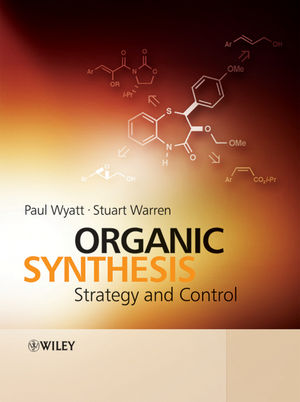Organic Synthesis: Strategy and ControlISBN: 978-0-471-48940-5
Hardcover
918 pages
June 2007
 This is a Print-on-Demand title. It will be printed specifically to fill your order. Please allow an additional 15-20 days delivery time. The book is not returnable.
Other Available Formats: Paperback
|
||||||
Organic Synthesis: Strategy and Control is the long-awaited sequel to Stuart Warren's bestseller Organic Synthesis: The Disconnection Approach, which looked at the planning behind the synthesis of compounds. This unique book now provides a comprehensive, practical account of the key concepts involved in synthesising compounds and focuses on putting the planning into practice.
The two themes of the book are strategy and control: solving problems either by finding an alternative strategy or by controlling any established strategy to make it work. The book is divided into five sections that deal with selectivity, carbon-carbon single bonds, carbon-carbon double bonds, stereochemistry and functional group strategy.
* A comprehensive, practical account of the key concepts involved in synthesising compounds
* Takes a mechanistic approach, which explains reactions and gives guidelines on how reactions might behave in different situations
* Focuses on reactions that really work rather than those with limited application
* Contains extensive, up-to-date references in each chapter
Students and professional chemists familiar with Organic Synthesis: The Disconnection Approach will enjoy the leap into a book designed for chemists at the coalface of organic synthesis.
The two themes of the book are strategy and control: solving problems either by finding an alternative strategy or by controlling any established strategy to make it work. The book is divided into five sections that deal with selectivity, carbon-carbon single bonds, carbon-carbon double bonds, stereochemistry and functional group strategy.
* A comprehensive, practical account of the key concepts involved in synthesising compounds
* Takes a mechanistic approach, which explains reactions and gives guidelines on how reactions might behave in different situations
* Focuses on reactions that really work rather than those with limited application
* Contains extensive, up-to-date references in each chapter
Students and professional chemists familiar with Organic Synthesis: The Disconnection Approach will enjoy the leap into a book designed for chemists at the coalface of organic synthesis.



